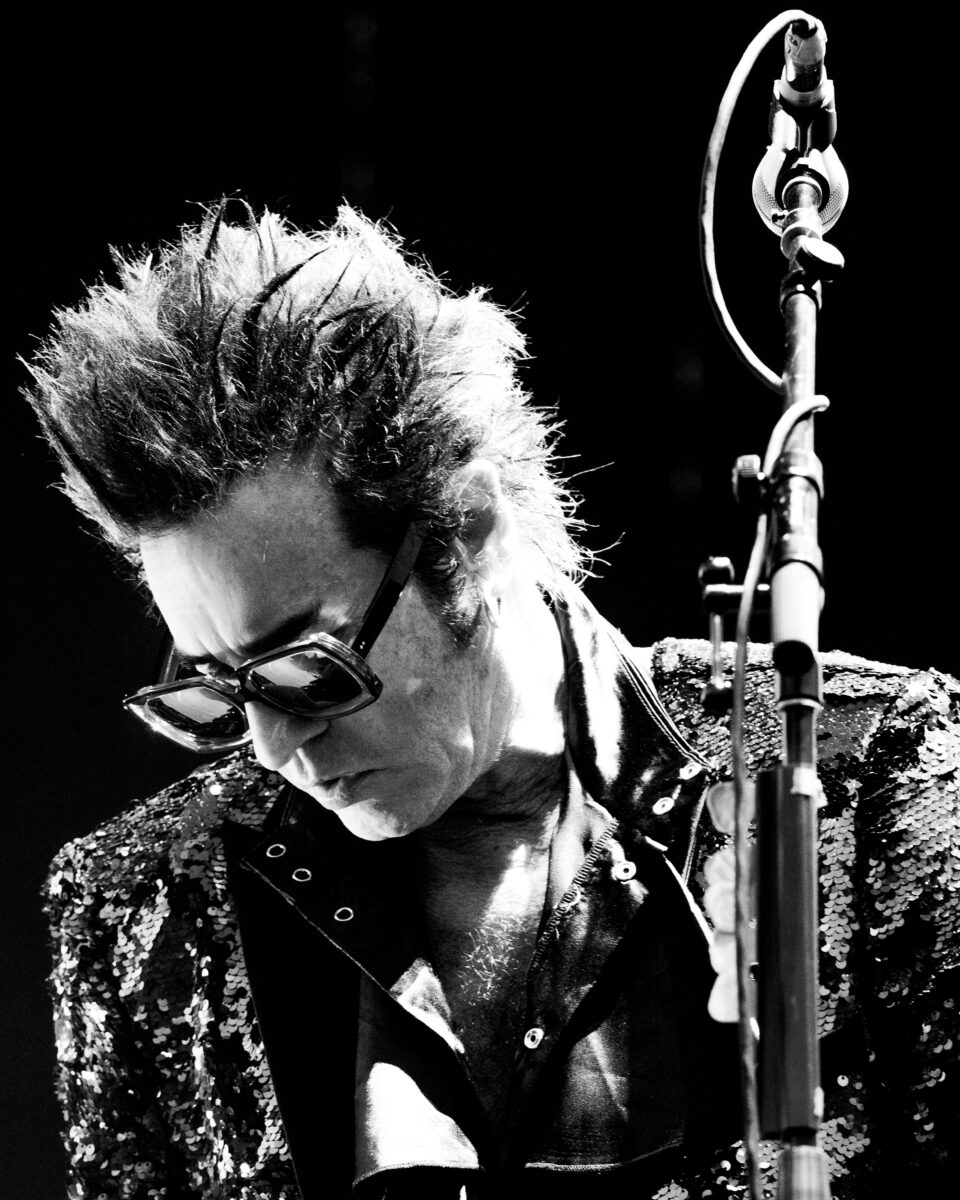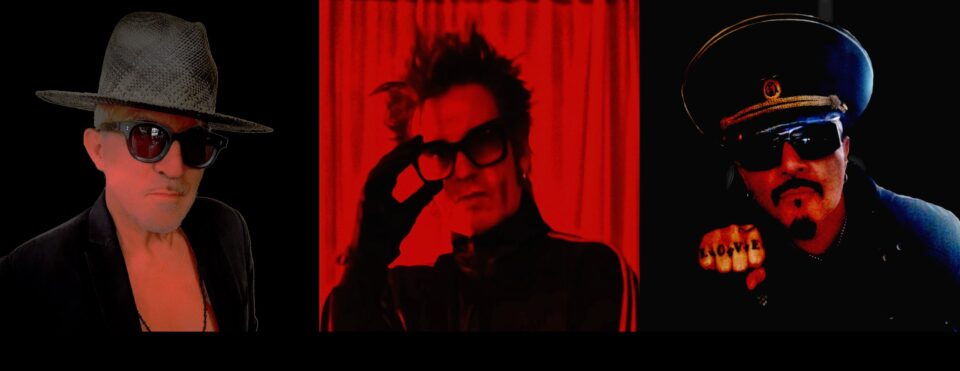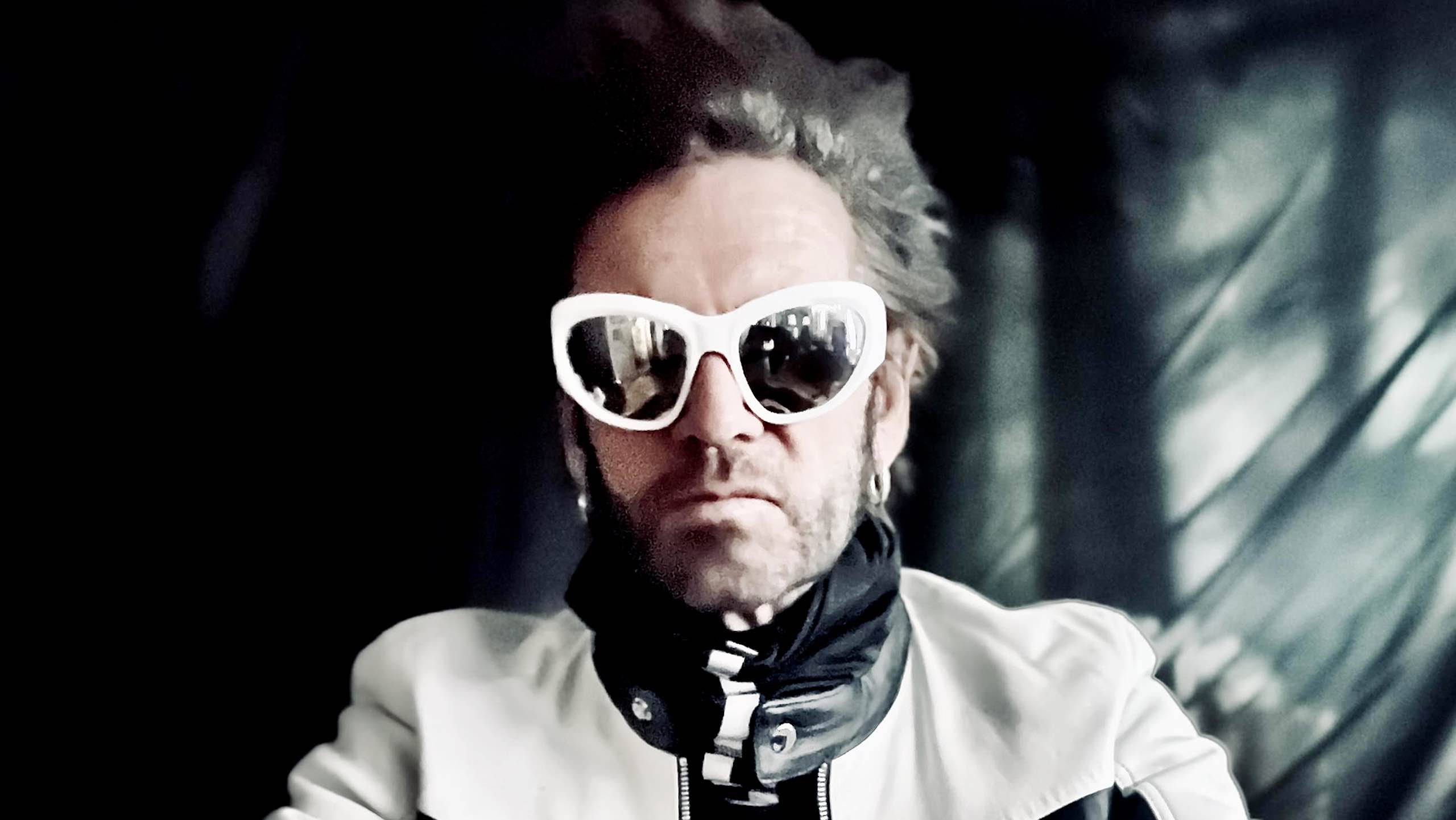Driving through Los Angeles on a hot afternoon, Daniel Ash is contemplating the fates while facing the glare of the sun in his eyes. The guitarist and vocalist who co-founded Great Britain’s massively influential Bauhaus with childhood friends—then did likewise with most of those same pals for his equally inspiring Love and Rockets when the former fell apart—has a new band with fellow alt-superstar Bruce Smith (drummer for PiL and The Pop Group) and Paul Spencer Denman (bassist for Sade) called Ashes and Diamonds.
To go with their daring forthcoming debut album, the Bond piss take Ashes and Diamonds Are Forever, the trio recently released a grimy, riveting single titled “On a Rocka,” whose motoring melody cuts like a knife through the Santa Ana skyline, and comes with a VistaVision video from Jake Scott, son of Ridley. To that end, the cinematic Ashes and Diamonds are doing everything right, and their namesake guitarist knows it. When Ash says that “this may be the best thing that I’ve ever done,” he could just be right, as Ashes and Diamonds pull from everything you’ve ever loved about his past—spidery glam vibes, chugging propulsion, frenetic post-punk guitar scrawl, snotty vocals—and imbues it with a dark, deep, snaky groove and a menacing, electronically enhanced ambience.
Yet for a man who sounds very sure of his artistry and sanguine about his newest album’s effort (to say nothing of having one of post-punk’s coolest hairdos throughout his tenure), Ash is pragmatic about the fates and his place in the pop-world musical firmament. “If this one doesn’t sell, I’m done,” Ash says without melancholy or joking about. He’s so matter-of-fact about it that I need to ask him again. “If this record doesn’t sell, I’m pretty sure that I’m going to call it a day.”
Let’s start this again. In consideration of Ash’s musical catalog—which includes several solo albums and recordings with Bauhaus/Love and Rockets drummer Kevin Haskins as Tones on Tail, alongside records from those bands he founded with Peter Murphy and David J—the guitarist is highly self-aware of who he is and where he’s been. “I don’t bother doing things or getting into musical ventures if I don’t think they’ll be successful, to a degree,” says Ash of fusing his past with his present. “And everything I’ve done has been successful, to a degree. It’s not a beggars-can’t-be-choosers thing.”
Seven years ago, Ash fielded a phone call from bassist Denman about simply getting together to play, to see where fate took them. “I go on instinct. I go on faith. I go with my gut and see how things feel,” he says. Instinct told Ash that the groove he dug with Denman, then Smith, was a solid one and to march forward. “I’m not calculated beyond that feeling. All through the years, it either felt right, sounded right, or it didn’t. I like a great song structure, as opposed to sound for sound’s sake. There has to be cohesion rather than trailing off on a vibe. Stuff like the Grateful Dead? I have no interest in that.”
“I don’t bother getting into musical ventures if I don’t think they’ll be successful, to a degree. And everything I’ve done has been successful, to a degree. It’s not a beggars-can’t-be-choosers thing.”

Daniel Ash at Cruel World 2023 / photo by Kevin Allen
From 1978 to 1983 (Bauhaus) and 1985 to 1998 (Love and Rockets), with respective reunions in 2023 and 2024, the bandmates that things felt and sounded rightest with for Ash were Murphy, J, and Haskins—so much so that his playing with so-called outsiders such as Smith and Denman seems oddly outside the guitarist’s circle of trust. Yet those earlier bands’ unions and reunions, for Ash, pretty much came down to practicality. “I’ve known those guys since we were children. I met Peter when I was 11 years old. We grew up together and played together since we were in our teens. It’s convenient to work with people who you’re hanging with—it’s natural.” When the conversation switches off Bauhaus and Love and Rockets, it doesn’t switch on again. Ash does, however, espouse the virtues and aesthetic values of Tones on Tail, the experimental outfit that recorded its sole album in 1984, bookended by EPs in 1982 and 1998. “Those really are some of my favorite recordings,” Ash says, quietly.
He digs the visual art that he’s made on occasion since his youngest school days, too—some on Love and Rockets’ record sleeves, some shown off during the video for the next Ashes and Diamonds’ single, “Teenage Robots.” He’s not keen on writing his own lyrics, despite how jarring the imagery of “2020” might be on his new album. “I’m lazy—writing lyrics is really hard work and I don’t like hard work,” he laughs while ruminating on the chance-encounter aesthetic of the cut-up method he uses as a lyrical tool, an artform popularized by William S. Burroughs. “And no, I’m not a fan.”

The one thing Ash loves unabashedly, however, is his motorcycles. The freedom that cutting up magazines does in discharging Ash from having to think up lyrics isn’t half as liberating as that provided by his many hogs. “I’ve become more and more obsessed with my motorcycles every day,” he says. “They’re the only thing that makes sense on this planet.” His bikes have been a topic for one of Love and Rockets’ signature hits, “Motorcycle,” as well as standing in for the topic of release espoused on Ashes and Diamonds’ “Champagne Charlie,” a song that’s about as unintentionally autobiographical as Ash is about to get. “That does sound like me, right?” he asks before blaming the random chance of the cut-up technique.
Right now, however, he loves discussing Ashes and Diamonds and how Denman and he nearly worked together in the 1980s, until Ash passed on the opportunity (“Now, I’m more mature and have nothing to lose”), and how they sought after Smith’s skill at the urging of Denman’s wife. Again, playing in a trio setting, as he had in Love and Rockets and Tones on Tail—“because there’s less guys to argue with… I don’t know how bands with seven or eight members do it”—Ash is far prouder of this new album than he’s been in a very long time. “I know that artists have this thing where they’re talking about their latest thing and saying it’s their best, but I don’t think like that, and so this is very real for me. The Ashes and Diamonds album is so eclectic and really well-produced. We took our time with this, and I’m just really in love with this record.”
“I know that artists have this thing where they’re talking about their latest thing and saying it’s their best, but I don’t think like that, and so this is very real for me.”
After a pause, he adds: “In fact, if this album doesn’t do anything, I’m pretty sure that I’m going to call it a day. I put a lot of time and effort into this record. If this doesn’t catch fire, I don’t see the point of making another record and another record and another record.”
As he laughs at my surprise, I bring up the idea of touring, the thing that most bands use as a money-making tool in a business where “sales” mean increasingly less to artists’ bottom line. “Well, we’re going to see how things are when it’s released. If there’s motion on the record, and it sells well, we’ll talk about a tour. If it doesn’t, we won’t.”
Before we mourn Daniel Ash’s way-premature retirement or suggest another Bauhaus reunion, he damn near consoles me in my shock. “Look, everything has its time—and I’m the first one to say that. Success is right on top of the list for me, and success is when a majority of the people are into your music. If the pre-orders are good, I’ll be glad to carry on. If they’re not, or the sales from its day of release aren’t good, then I’m done. And I have no problem with that at all. I ride my bikes every day, so I can do that instead. I’m not one of those art-for-arts-sake people, and need to keep flogging it. I’d rather just go for a ride.” FL







